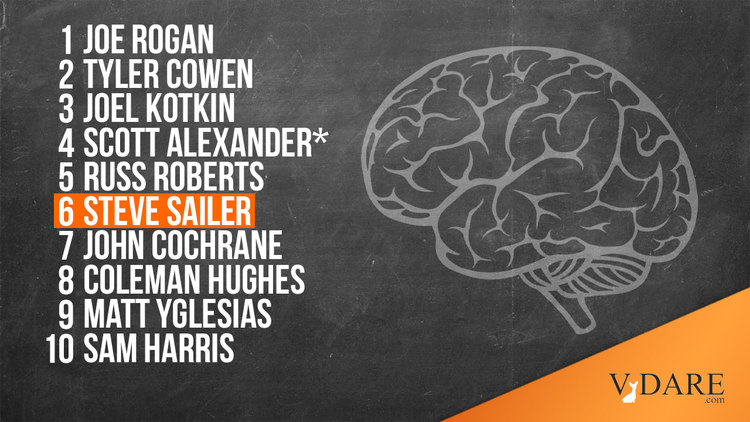


By Steve Sailer
03/30/2021
At economist Arnold Kling’s Ask Blog, a contest:
The top 150 intellectuals, selected competitively
Posted on March 29, 2021 by Arnold Kling
We held the Fantasy Intellectual Teams draft on Saturday. 10 owners competed. The owners came from the readership of this blog, and they themselves are not public figures in any way. The intellectuals they chose are shown below in the order they were selected. …
Scoring for this season, which starts April 1 and ends June 30, is based on three categories:
(M) memes. These are phrases that are associated with a certain intellectual. For example, Black Swan is associated with Taleb (pick 31). If during the season the term Black Swan is used in at least three prominent places (well-known podcast or blog, newspaper, new book), that scores one M for Taleb. No more than one M per season for each catch-phrase. Richard Dawkins, who coined the term “meme,” was not chosen, although picking him would have guaranteed his owner at least one meme point.
(B) bets. An intellectual scores a B by expressing a belief in quantitative probabilistic terms. Oddly enough, Annie Duke, who would be credited with a meme if the phrase “Thinking in Bets” were to appear three times during the season, was not selected, either.
(S) steel-manning.
I.e., the opposite of constructing a straw-man argument.
The intellectual presents a point of view with which he or she disagrees in a way that someone who holds that point of view would consider to be representative. It is the opposite of straw-manning. I believe that Peter Thiel (pick 70) coined the term, or at least popularized it, and his owner is all but certain to pick up an M point. S’s are most likely to be earned by bloggers and podcasters and least likely to be earned by tweets or political speeches. They are more likely to be earned by centrists than by hard-core Red or Blue team members.
… I think that for next season I would add a category (R), for summarizing the research on two (or more) sides of a controversial issue. I would score one R for every 2 examples. I don’t want to give away an R to someone who just looks at research on a single topic during the season. Adding the (R) category would make Tyler and Scott even stronger candidates.
1 Joe Rogan
2 Tyler Cowen
3 Joel Kotkin
4 Scott Alexander*
5 Russ Roberts
6 Steve Sailer
7 John Cochrane
8 Coleman Hughes
9 Matt Yglesias
10 Sam Harris
11 Noah Smith
12 Glenn Greenwald
13 Martin Gurri
14 Jordan Peterson
15 Brett Weinstein
16 Matt Stoller
17 John McWhorter
18 Matt Ridley
19 Lex Fridman
20 Heather Heying
21 Roger Kimball
22 Glenn Loury
23 Jonathan Haidt
24 Eric Weinstein
25 Wilfred Reilly …
So, I was the #6 draft pick out of 150 selectees.
Unfortunately, I don’t think I will score well for whichever team drafted me. Granted, I’ve been around a long time, so I’ve built up an inventory of catch phrases that other people occasionally use. But, my turn of mind seems to be anti-viral, so almost none of the seemingly clever terms I’ve thought up have ever spread quickly. (A few have spread slowly, but my mindset is basically orthogonal to the popular one, so my catchphrases only catch on if they’ve proven valid over many years.)
Second, I don’t like bets about the future very much. I have a hard enough time noticing the present. My usual forecast is that the future will be like the present, only more so. For example, I would bet that between now and the end of the year, the Woke will dream up a whole new reason for canceling a white individual with a good job that will seem absurd when first trotted out, but by the end of the year will strike everybody as routine whaddaya-whaddaya.

Third, I’m not that excited about steelmanning — rewriting somebody’s argument to be better than he made it himself. Almost everybody I take on has some institutional influence (a few are famous freelancers like Taleb). The New York Times has lots of money to pay for writers and editors to say it the way they want it said.
What I often do is point out the valid point that somebody is making if most people are overlooking it. For example, consider my profiles of Foucault and Edward Said referenced below. Foucault had plenty of opportunities to express himself fully. If he left his meaning unclear at times, it was no doubt because he felt it prudent to not say explicitly the stupid things he was encouraging his disciples to believe for fear that he would be made fun of for spelling it out. So I’m not going to go out of my way to rewrite Foucault.
In contrast, in Orientalism, Said said something brave, but almost nobody noticed this perfectly reasonable and normal gripe he was sore about. So, I will gladly explain in my brusque way the heart of Said’s complaint: European intellectual sex tourists, especially gay ones like Foucault, should keep their filthy hands off our Arab boys and girls and stay the hell out of the Arab world.